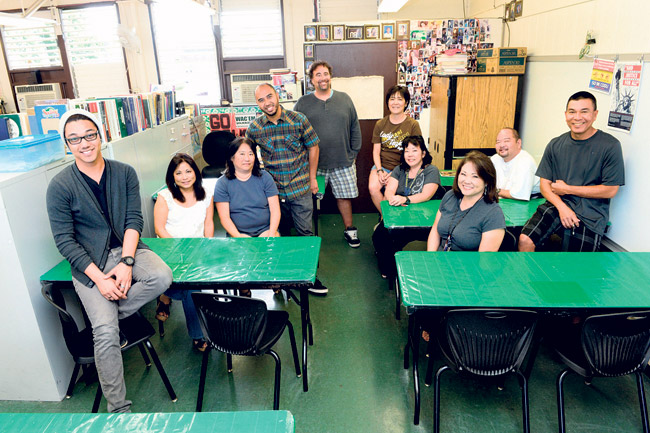Storefront School For At-risk Youths

(from left) Teachers Jonah Nakaza-Koizumi and Shari Kunimura; clerk Lois Shishido; teachers Elton Gemeno-Hing and Larry Dembinski; coordinator Colette Miyamoto Kajiwara; teachers Cathy Nakamura, Shelley Miyasato, Nate Komata and Derek Tengan | Nathalie Walker photo
Many have given up on school dropouts, runaways and teens battling drug addiction, whose educational progress is severely jeopardized because of poor choices and unfortunate circumstances. But the state Department of Education’s High Core Program/Storefront School teaches these youths valuable skills and gives them the tools to succeed in life.
The late Ed Tonaki founded Storefront School and Central Oahu Youth Services Association (COYSA) 46 years ago as alternative educational and housing outlets aimed at reforming at-risk students.
“Our country was undergoing social unrest at the time, a lot of glue- and paint-sniffing. The kids cut class and hung out at the boat ramp in Wahiawa in abandoned cars,” says Storefront High Core coordinator Colette MiyamotoKajiwara, who succeeded Tonaki and has been with the program for 33 years.
Today’s generation faces “spice,” methamphetamine abuse and other forms of modern-day substances and challenges, but the need for reform is still in high demand. Teachers dedicate their talents to assist youngsters deficient in graduation credits because of sporadic attendance.
Students fail in classes, are teen substance-abusers and/or pose threats to themselves and others. Storefront helps them to “get their act and academics in order.”
Miyamoto-Kajiwara perpetuates the legacy left behind by Tonaki, whose commitment was to keep students academically involved and entice them back into the classroom. Storefront’s name is derived from the Mainland, where outreach counselors once taught street kids hanging out at storefronts. Instead of facing incarceration, some youths are court-ordered to enroll. All are behaviorally and/or academically challenged and come from a range of poverty-stricken to affluent backgrounds.
Storefront services 300 of the most severely “alienated” students in the Central District on Oahu and throughout Hawaii. Its approach reinforces solid principles that give students the encouragement and motivation they need to combat life’s struggles.
It’s a total team effort that makes the program the success it is, and its coordinator credits a staff of academic trainers and counselors – Derek Tengan, Shelley Miyasato, Cathy Nakamura, Shari Kunimura, Larry Dembinski, Nathan Komata, Elton GemenoHing, Jonah NakazaKoizumi and Lois Shishido – who play a key role in the students wanting to improve their academic performance, attitude and behavior. The curriculum concentrates on language arts, math, social studies, science and some electives.
Miyamoto-Kajiwara and staff feel most fulfilled when students overcome the odds and make a genuine commitment to change for the better.
One success story is a troubled teen whose only option was the youth correctional facility because of her recurring drug battles.
Fortunately, Storefront never gave up and eventually saved her.
“We became her friends, confidantes, advisers, disciplinarians and surrogate parents, and helped her rebuild her life,” says Miyamoto-Kajiwara, who teaches the students that they need to be “resilient in order to move forward, because backward is not an option if they want to survive.” That young woman is now in her late 30s, 20 years sober and a director in a retail corporation. Who knows what she might have become had intervention not been provided.
At High Core Program/Storefront School, students learn how to make good decisions, feel that it is possible to love and be loved, and gain personal respect. They blossom into contributing members of the community and get a second chance at life.
“We appreciate the DOE and the community’s support in taking care of Hawaii’s youths in dire need of our assistance,” says Miyamoto-Kajiwara.
For more information on how you can help, call 622-4363 or 621-7717.
mufi@ mufihannemann.com



